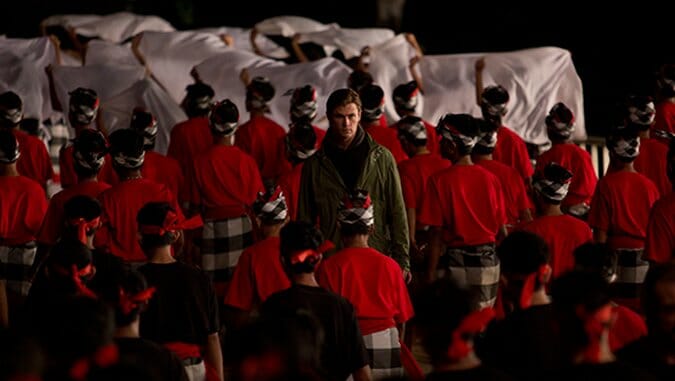Blackhat

Perhaps when a director signs on for a certified “cyberthriller,” they become contractually obliged to deliver one of those “inner workings” CGI sequences that lost their appeal shortly after David Fincher sent us hurtling through the brain’s neural network in Fight Club’s opening minutes. If that is, in fact, the case, then Michael Mann tends to this compulsory element as quickly as possible in Blackhat.
We’ve spent but seconds inside a Hong Kong nuclear reactor before we’re secreted inside the facility’s mainframe, gliding over its circuitry as it’s compromised by a shadowy hacker’s malware. And while the artificiality of this increasingly corrupted copper, solder and silicon topography seems an affront to the realism to which Mann typically aspires, it does speak to the intricacy and precision that he so evidently admires about illicit enterprises. Be it the meticulous safecracking in Thief or the stopwatch-synchronized heists of Heat, the director has routinely demonstrated that he’s only intrigued by those criminals who’ve elevated themselves to craftsmen. Mann’s fascination with such figures persists in Blackhat, but his own work now proves more experimental and expressionistic than exacting, resulting in the rare procedural that hinges on mood rather than story mechanics.
The antihero on offer here is Nicholas Hathaway (Chris Hemsworth), a hacker imprisoned for electronically pilfering a small fortune from banks. Just as he’s eager to assure us that he targeted institutions rather than individuals, he likewise takes pains to assert, “I’m doing the time, the time’s not doing me,” which is one of many lines in Morgan Davis Foehl’s script that’s not quite as clever as it fancies itself. However, the underlying notion of a convict using his cell as a cocoon in which physical and intellectual transformation might be realized is one that obviously appeals to Mann, who’s always fancied an adaptable protagonist. (It also offers a convenient rationale for why a rogue code monkey is built like a Norse god.)
When a disastrous meltdown at the aforementioned hacked reactor is followed by another cyber assault on the Chicago Mercantile Exchange that instigates a spike in the price of soy futures, two things become plainly evident. The first is that the FBI—represented by Viola Davis’s Carol Barrett—and Chinese intelligence—headed by Leehom Wang’s Chen—must pool their resources and spring Hathaway from prison in order to identify and eliminate the unseen assailant. The second being that Mann no longer possesses (or no longer seems interested in flexing) the virtuosity required to make this onerous setup any more involving than the “Getting Started” tutorial for a new printer.
-

-

-

-

-

-

-

-

-

-

-

-

-

-

-

-

-

-

-

-

-

-

-

-

-

-

-

-

-

-

-

-

-

-

-

-

-

-

-

-








































